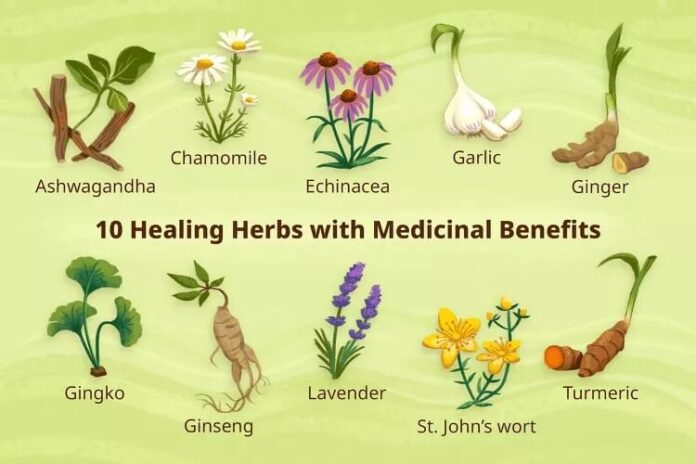Healing herbs, also known as medicinal plants, have long been used to treat various ailments. Sourced from the wild or cultivated intentionally, these plants provide numerous benefits. As reported by verywellhealth, they’re traditionally used to alleviate stress, anxiety, inflammation, nausea, and pain or to treat conditions like the common cold and toothaches.
Common examples include ashwagandha, chamomile, echinacea, garlic, turmeric, and ginger. These herbs contain potent volatile oils that give them their therapeutic properties.
Top 10 Healing Herbs and Their Benefits
- Ashwagandha
- Traditional Uses: A key herb in Ayurvedic medicine, ashwagandha helps reduce stress, lower cortisol levels, boost energy, and enhance male sexual health.
- Forms: Available as powders, capsules, and tinctures; it’s commonly mixed into smoothies, teas, or desserts.
- Precautions: Avoid during pregnancy or when taking certain medications like anticonvulsants.
- Chamomile
- Traditional Uses: Known for its calming properties, chamomile is commonly used as tea for relaxation and inflammation reduction.
- Forms: Found in teas, capsules, and topical applications.
- Precautions: May interact with blood thinners or cause allergic reactions in sensitive individuals.
- Echinacea
- Traditional Uses: Used for colds, flu, and wound healing. Rich in anti-inflammatory and antiviral compounds.
- Forms: Available as teas, capsules, and tinctures.
- Precautions: Prolonged use can affect the immune system. Avoid if allergic to plants like ragweed.
- Garlic
- Traditional Uses: Valued for its antimicrobial and heart health benefits, garlic may help lower blood pressure and reduce cancer risks.
- Forms: Eaten raw or cooked; also available as capsules and oils.
- Precautions: Can increase bleeding risks; avoid before surgeries or with blood thinners.
- Ginger
- Traditional Uses: A remedy for nausea, pain, and inflammation, ginger is widely used in both medicine and cuisine.
- Forms: Consumed fresh, dried, or as tea and supplements.
- Precautions: Generally safe, though large doses may cause stomach discomfort.
- Ginkgo
- Traditional Uses: Traditionally used for cognitive health and respiratory issues. Often marketed for memory enhancement.
- Forms: Found in capsules, tablets, and teas.
- Precautions: Avoid seeds due to toxicity. May increase bleeding risk when combined with certain medications.
- Ginseng
- Traditional Uses: Known for boosting energy, immunity, and circulation, ginseng also supports brain health and diabetes management.
- Forms: Consumed raw, as tea, or in supplements.
- Precautions: Long-term use may decrease effectiveness. Monitor blood sugar levels if diabetic.
- Lavender
- Traditional Uses: Renowned for its calming effects, lavender promotes sleep, uplifts mood, and relieves pain.
- Forms: Found in teas, essential oils, and topical products.
- Precautions: Essential oil should not be ingested and may cause skin irritation if undiluted.
- John’s Wort
- Traditional Uses: Used to manage mild depression, wound healing, and menopausal symptoms.
- Forms: Available in capsules, oils, and tinctures.
- Precautions: Can interact with medications, including antidepressants, leading to serious side effects.
- Turmeric
- Traditional Uses: This bright yellow spice is prized for its anti-inflammatory and antioxidant properties, aiding joint health and digestion.
- Forms: Used in cooking, as supplements, or teas.
- Precautions: High doses may cause stomach issues or interact with blood-thinning medications.























